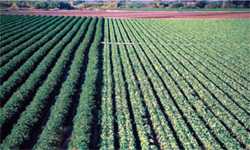Biorational Approach: Resistance Management

Integrated Pest Management is a crop protection strategy directed towards preserving beneficial insects and having minimal impact on the environment. Bt insecticides are an ideal tool for the grower focused on IPM due to their selective control and environmental friendliness.
Entomologists and IPM specialists have cited the following benefits of Bt insecticides:
- Very low impact on beneficial insects.
- Avoidance of secondary pest problems.
- Not toxic to bees and predatory mites.
- No preharvest interval required after application.
- No restrictions on use.
- Resistance to Bts slower to develop than resistance to chemicals – new or traditional.
Bts aren’t intended to replace traditional chemicals, however. Both traditional chemicals and Bts have a place in the grower’s toolbox. Bts can control pests just as traditional chemicals, but also provide added benefits such as resistance management and maintaining beneficial insects. Indeed, Bts can revive the life cycle of a traditional chemical by preventing over-use.
Perhaps the best way to think of Bts is as a valuable piece to the puzzle. Just as using a single traditional chemical wouldn’t make any sense, Bts are best used as one element of a comprehensive program that accounts for all of the many variables they are able to manipulate. In fact, some might argue that the best time to use Bts is when a new chemical comes out on the market. Combining the two makes for a sustainable program – sustainable both environmentally and economically – and will manage resistance, keeping all products working effectively through many years of profitable production.
Talk to any pest control adviser or university researcher, and they’ll tell you that one of the biggest problems the modern grower is facing and will increasingly face in the future is resistance. Whether an insect, weed or pest population, more and more of the older, traditional products don’t generally work as well as they used to.
Because of their unique modes of action, Bt insecticides have long been cornerstones of pesticide resistance management programs around the world. Rotating chemicals certainly helps in warding off resistance problems. But an even better approach is to – through proper scouting – apply Bt insecticides at strategic points in the crop season. This can alleviate the need to rely on traditional chemicals and oftentimes improve their efficacy later on.
Bts have much more complex modes of action than their traditional counterparts, which means it is somewhat more difficult for insects and plant pathogens to develop resistance. This is especially true when used in an IPM program. It’s a win-win, because not only do you suffer fewer resistance problems, but you reap specific benefits such as reduced crop protection costs.
For example, a grower could use a Bt early in the season. It not only costs less than the chemical, but offers a high kill rate early in the season while infestation levels are low, and also helps maintain beneficial populations. In mid-season, traditional chemicals maintain a clean field and increase the spectrum of activity. With an application prior to harvest, the Bt brings the benefit of clean crops at packout, the lowest possible preharvest interval, minimized chemical residue, and diverse modes of action to maximize the product life cycle.









